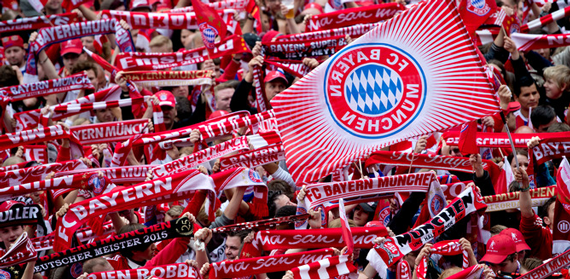Image: EPA/Sven Hoppe
Guest post by Simon Chadwick
If the European Union was a football team, right now it would be languishing in the relegation zone. The EU’s disjointed approach to the current influx of migrants and refugees is reminiscent of the rampant individualism displayed in some of Europe’s ego-laden, under-performing football clubs.
But there is an EU team putting together some good passes and scoring important goals – Germany. While other countries have been caught flat-footed, the Germans have been as deft and assured as ever, just like the country’s football teams.
Whether it’s the World Cup, the European Championship or the Champions League, it is normally safe to say that a German team will be in contention for the overall honours. Collective identity and the team’s best interests seemingly always trump individualism and ego.
And, as Germany has opened its borders to people fleeing conflict in the Middle East, so German football has responded in the same way.
Leading from the front, Bayern Munich last week pledged €1m to projects supporting the refugees now entering Germany. Meanwhile FC Schalke invited 100 refugees to their first home game of the season, and the club is organising clothing and toy collections. Other clubs, such as Borussia Dortmund and Werder Bremen are following suit with similar initiatives.
In one sense, we shouldn’t be surprised by such responses; after all, we are constantly reminded of the unique position that football clubs hold. What is now happening in Munich, Dortmund and Bremen shows how deeply embedded Europe’s clubs are in the communities where they are located, although German football seems especially unique.
Football fans in Germany said #RefugeesWelcome this weekend, RT if you think the UK should step up to the mark. pic.twitter.com/dOZnND9XOc
— #RefugeesWelcome EFL (@RefugeesEFL) September 3, 2015
While clubs in some countries often appear more concerned with counting their moneyand in others with pandering to racists, German clubs have always had a close relationship with their fans – promoting good governance, democracy and their involvement in decision-making. As such, German fan behaviour has mirrored that of their clubs and society in general, recent stadium banner displays welcoming immigrants being one example of this.
However, before we get too carried away in extolling the virtues of German football, keep in mind that the country’s clubs spent €397m on players during this summer’s transfer window. Of this total, Bayern Munich spent upwards of €80m which is considerably more than the club is spending on refugees.
Still, we shouldn’t be too harsh; doing something is better than doing nothing. Indeed, as the Germans have engaged, the rest of Europe has floundered. No sign yet of a convincing English response, but as the British government spent €9.5m on erecting fences in Calais, English clubs had a field day, spending €1.2 billion to bring new players in during the transfer window.
It is therefore ironic that, as David Cameron has sat on his expensively constructed immigrant fence, England international Saido Berahino has been pursued by several top clubs. Tottenham Hotspur reportedly bid more than €27m for the West Bromwich Albion centre-forward – an amazing price for a young man whose father was killed in the Burundian civil war and who subsequently travelled alone to Britain as a ten-year-old immigrant.
West Brom and England Forwards, Saido Berahino: Reuters
It may be not so shocking then that online gambling company Paddy Power recently placed adverts on trucks passing through Calais. A direct reference to immigrants seeking to stowaway on them, these adverts read: “Immigrants, jump in the back! (But only if you are good at sport.)”
Whether or not sports clubs, football and otherwise, across Europe should intervene in matters of immigration remains a moot point in many countries. The socially democratic Germans may perceive a moral obligation to do something; the economically liberal English seem less inclined either to welcome a mass influx of immigrants or to have their football terraces taken over by demonstrations of support for them.
Doing good by doing well
Nevertheless, the past few months have brought into sharp focus the increasingly important role that sports clubs can play across Europe. What was in the 19th century seen as football’s social role is now presented in the 21st century as being “corporate social responsibility” (CSR). CSR is in vogue right now, across industry in general, in sport and, more specifically, in football.
Some commentators view CSR as being important for the way it highlights the broader social, environmental and cultural contexts in which organisations function. At one level, this means that in times of, say, migration crises, organisations shouldn’t simply abrogate all responsibility and should engage with such issues, particularly when their stakeholders are affected. For German football and the likes of Bayern Munich, helping Syrians get to Bavaria isn’t therefore simply a moral obligation it’s good CSR too.
But, some commentators point out that CSR is as much about doing good business as it is about being moral. For instance, one argument could be that catching the current immigration zeitgeist is one way an organisation can project a positive image to customers – if you appear virtuous and behave well, people are more likely to buy from you. As such, we are already seeing some brands responding to the migrant crisis.
Perhaps German football’s apparent altruism needs to be viewed in this context – could this be a big fan engagement exercise? The country has strong connections to the Middle East, most notably through the country’s Gastarbeiter, or “guest worker”, programme. This has led to a large diaspora of people with Turkish origin living in the country.
We can see the commercial impact of this in various ways, one being the lucrative sponsorship deal between Borussia Dortmund and Turkish Airlines, another being the players available to Germany (such as Mesut Özil). Some German clubs attach even more importance to the Middle East. Bayern Munich has been targeting fans and players in Iran for more than a decade, while the team is a regular visitor to countries such as Qatar.
This shouldn’t detract from the noble, moral gestures we are now seeing in German football. In fact, in many ways, this is what good CSR is all about: doing well by doing good. Either way, as Germany leads the way, one can only hope that sports organisations in other parts of Europe see the benefits of scoring some crucial immigration goals.
Originally written for ‘The Conversation’.





Comments are disabled